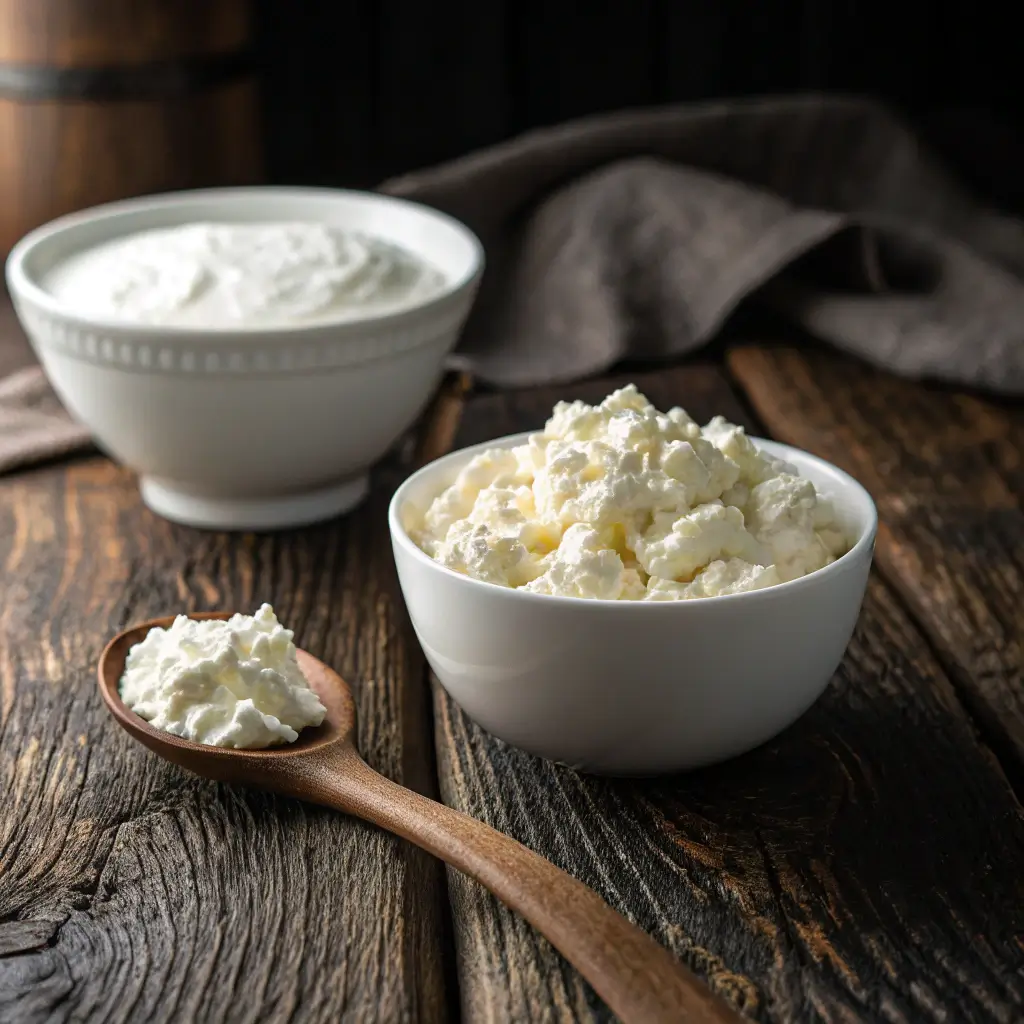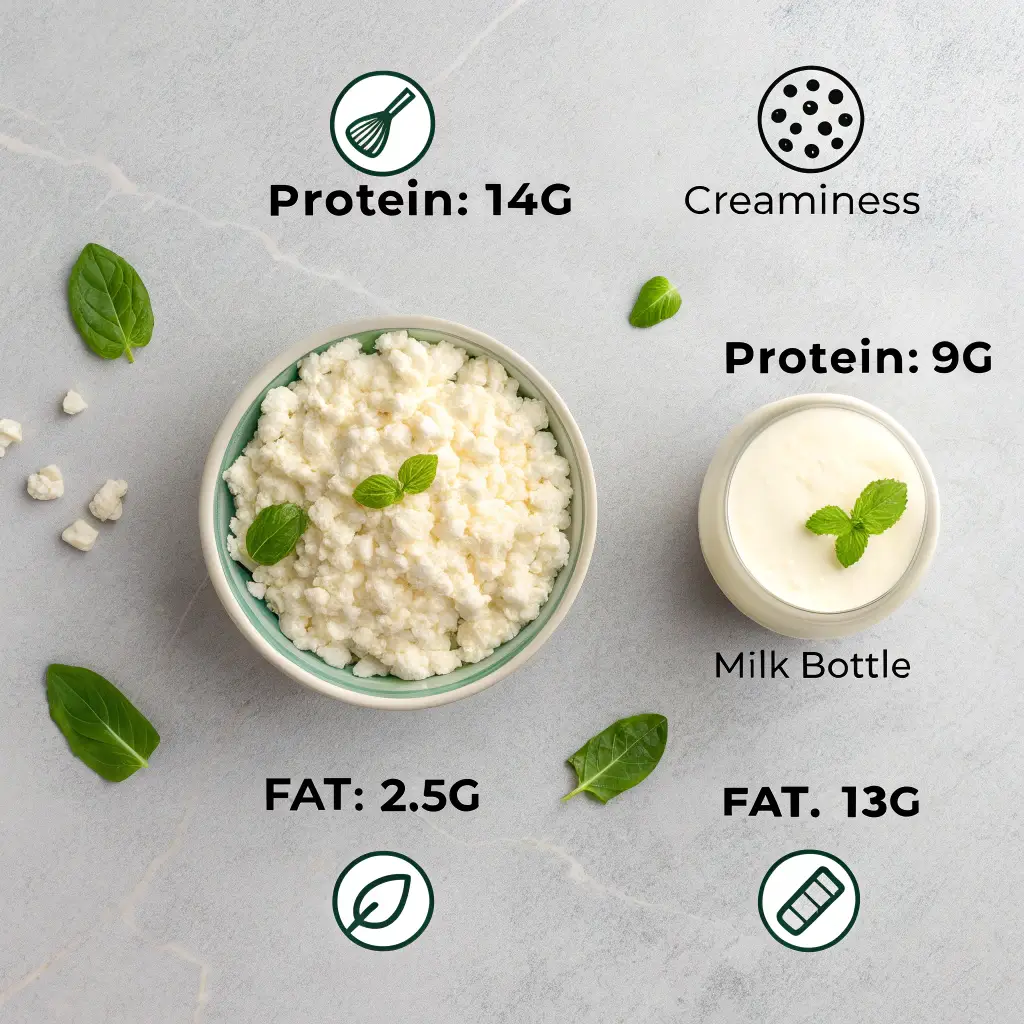
So, you’re standing in the dairy aisle. On one side, cottage cheese, looking all lumpy and dependable. On the other, ricotta, looking impossibly creamy and Italian. They’re both white cheeses, right? Kinda the same? Oh, what a tragic oversimplification. For anyone who’s ever tried to count a macro or salvage a recipe, the cottage cheese vs ricotta debate is a serious one. Choosing one over the other isn’t just a choice—it’s a statement about your kitchen, your fitness goals, and frankly, your life. Let’s dive into this dairy drama.
Table of Contents
Table of Contents
II. Nutritional Showdown: Cottage Cheese vs Ricotta
Okay let’s get into the nitty-gritty of the cottage cheese vs ricotta comparison. But forget boring charts. Think of this as the tale of the tape for two prize fighters. We’ll use a 1/2-cup serving, because who eats less than that?
In this corner, the lean machine, 2% Cottage Cheese: it clocks in at a featherweight 90 calories, but—and this is the knockout punch—boasts a staggering 12-14 grams of protein. Fat? A measly 2.5 grams. This is the stuff that all those TikTok recipes are made of, and for good reason. It’s a protein cheat code. See our full cottage cheese macros guide if you’re obsessed.

And in the other corner, the heavyweight champion of creaminess, Whole-Milk Ricotta: a decadent 180 calories, with around 13 grams of fat that will make you weep with joy. The protein is lower, maybe 9-11 grams, but who’s counting when something tastes this heavenly? The nutritional difference in the cottage cheese vs ricotta matchup is stark.
III. Cottage Cheese vs Ricotta in the Kitchen
In the kitchen, the cottage cheese vs ricotta fadebate truly comes alive, as this is where their personalities truly clash. Cottage cheese is… functional. I remember my mom trying to sneak it into our mac and cheese and the lumpy texture was just an abysmal failure. But blended? It’s a whole other story. Whiz it until it’s smooth and suddenly it’s this amazing, tangy base for dips or a secret weapon in pancakes.
Ricotta needs no such help.
It’s effortlessly perfect. It’s the pillowy, cloud-like heart of a perfect lasagna. It’s the soul of a cannoli. My nonna would disown me for saying this, but you can whip ricotta with a bit of lemon zest and honey and eat it with a spoon. When substituting one for the other in the great cottage cheese vs ricotta swap, it’s a high-risk game. It’s just a different universe.
IV. Health & Fitness
If your life revolves around the gym, the cottage cheese vs ricotta decision is simple: cottage cheese is your ride-or-die. I mean, it’s practically pure casein protein, the slow-digesting kind that people chug in shakes before bed to build muscle. It’s a beast. For shedding pounds, it’s a no-brainer, and you’ll find it on every list of high-protein foods.

When it comes to pure fitness fuel, ricotta just can’t compete in the cottage cheese vs ricotta face-off. It’s not a fitness food; it’s just… food. And that’s okay! But then there’s the sodium issue again. The high sodium in cottage cheese can be a real drawback, making ricotta a gentler choice in that regard. It’s all a trade-off, isn’t it? Everything is.
V. Cost & Availability:
Let’s be real, the grocery bill stings these days, and it’s a key factor in the cottage cheese vs ricotta choice for many. In this department, cottage cheese is the clear winner for your wallet. It’s a staple, it’s everywhere, and store brands are dirt cheap. Ricotta, on the other hand, often sits in the dairy case like it’s royalty, with a price tag to match. They both go bad annoyingly fast, so check the date. That watery stuff on cottage cheese? Just whey. Stir it in, don’t be a coward.
VI. Final Verdict: When to Choose Cottage Cheese vs Ricotta
So, who wins the cottage cheese vs ricotta duel? The answer depends entirely on your needs.
Choose cottage cheese if you’re chasing protein goals, trying to lose weight, or your bank account is screaming for mercy. It’s the practical, smart choice.
Choose ricotta when your soul needs feeding. When you’re making a dish that needs to be unapologetically rich, creamy, and comforting. When calories are just a number and joy is the main ingredient. If you’re stuck, plain Greek yogurt can sometimes sub in, but that’s a whole other can of worms we cover in the cottage cheese vs. Greek yogurt showdown.
faqs
1. Can I use cottage cheese in lasagna instead of ricotta?
Look, you can. But understand that this choice in the cottage cheese vs ricotta lasagna swap will change the texture. For the love of all that is holy, put the cottage cheese in a blender first. Blend it until it’s super smooth. It will lower the fat, sure, but it’s gonna have a bit of a tang. It won’t be the same creamy, dreamy lasagna you know and love.
2. Which is better for weight loss: cottage cheese or ricotta?
The cottage cheese vs ricotta comparison for weight loss isn’t even a fair fight. Cottage cheese wins, hands down. It’s packed with protein that makes you feel full on way fewer calories. That combo is the holy grail of weight loss foods. Eating a bowl of cottage cheese is like telling your hunger to go sit in a corner for a few hours.
3. Is ricotta cheese healthy?
Healthy is such a loaded word, you know? Ricotta has tons of good stuff—protein, calcium, all that jazz. Whole-milk ricotta has a lot of fat, yeah, but fat isn’t the enemy. It’s also super low in sodium which is a huge plus in the cottage cheese vs ricotta health debate. So, can it be part of a balanced, happy diet? Absolutely. Don’t fear the ricotta.
4. Why is my cottage cheese watery?
Ugh, I know, it looks kinda gross. But that liquid is just whey, which is actually a type of protein. The curds and whey just separate over time. It’s totally normal and doesn’t mean it’s gone bad. Some people pour it off for a thicker texture, but I just stir it right back in. Don’t overthink it, it’s fine.
While both cheeses offer nutritional benefits, cottage cheese is particularly protein-dense and helps promote satiety, making it effective for weight management. Ricotta contains high-quality whey protein with essential amino acids but is generally creamier and often described as a lighter version of cottage cheese. Food Struct
